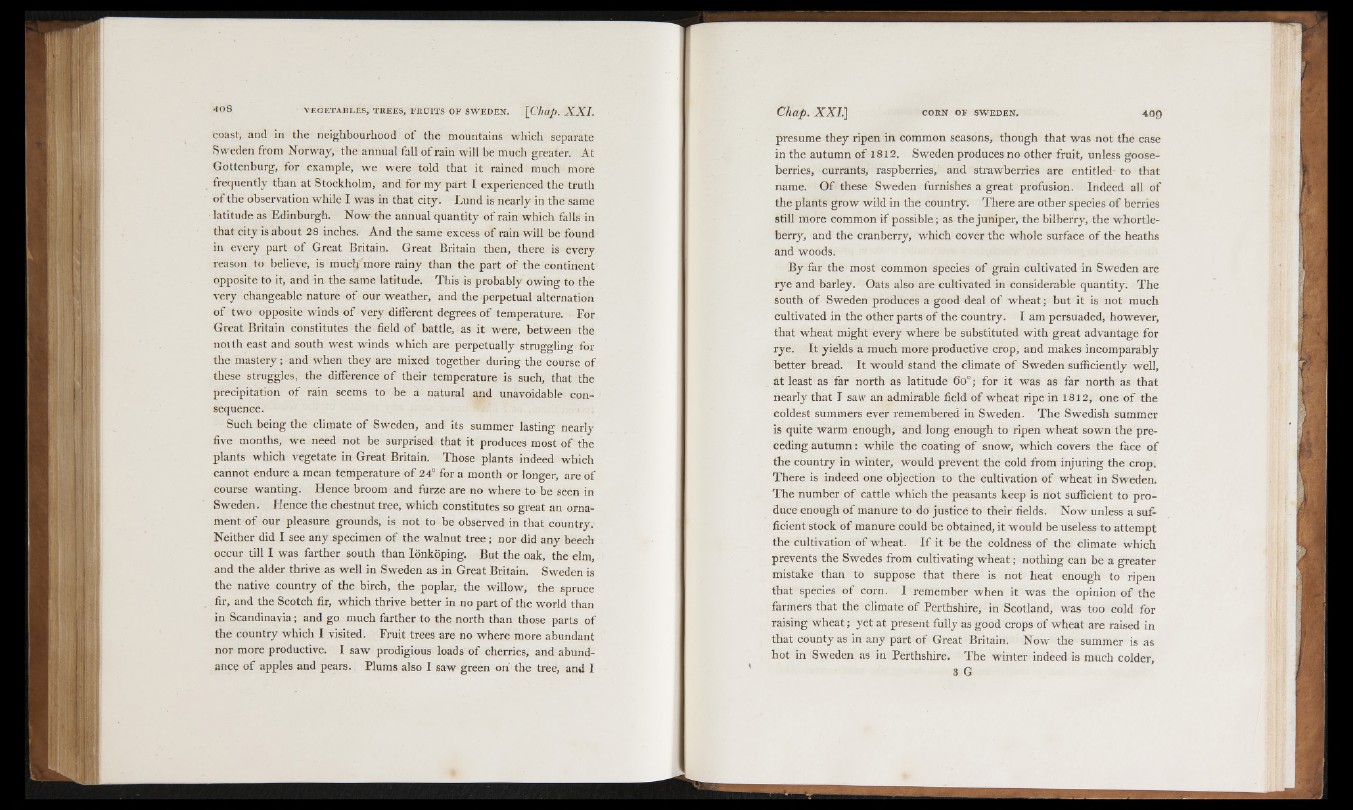
coast, and in the neighbourhood of the mountains which separate
Sweden from Norway, the annual fall of rain will be much greater. At
Gottenburg, for example, we were told that it rained much more
frequently than at Stockholm, and for my part I experienced the truth
of the observation while I was in that city . Lund is nearly in the same
latitude as Edinburgh. Now the annual quantity of rain which falls in
that city is about 28 inches. And the same excess of rain will be found
in every part o f Great Britain. Great Britain then, there is every
reason to believe, is mucl) more rainy than the part of the continent
opposite to it, and in the same latitude. This is probably owing to the
very changeable nature o f our weather, and the perpetual alternation
of two opposite winds o f very different degrees of temperature. For
Great Britain constitutes the field o f battle, as it were, between the
noith east and south west winds which are perpetually struggling for
the mastery; and when they are mixed together during the course of
these struggles, the difference o f their temperature is such, that the
precipitation of rain seems to be a natural and unavoidable consequence.
, i ,
Such being the climate o f Sweden, and its summer lasting nearly
five months, we need not be surprised that it produces most o f the
plants which vegetate in Great Britain. Those plants indeed which
cannot endure a mean temperature of 24° for a month or longer, are of
course wanting. Hence broom and furze are no where to be seen in
Sweden. Hence the chestnut tree, which constitutes so great an ornament
o f our pleasure grounds, is not to be observed in that country.
Neither did I see any specimen o f the walnut tree; nor did any beech
occur till I was farther south than lonkoping. But the oak, the elm,
and the alder thrive as well in Sweden as in Great Britain. Sweden is
the native country o f the birch, the poplar, the willow, the spruce
fir, and the Scotch fir, which thrive better in no part of the world than
in Scandinavia; and go much farther to the north than those parts of
the country which I visited. Fruit trees are no where more abundant
nor more productive. I saw prodigious loads of cherries, and abundance
o f apples and pears. Plums also I saw green on the tree, and I
presume they ripen in common seasons, though that was not the case
in the autumn o f 1812. Sweden produces no other fruit, unless gooseberries,
currants, raspberries, and strawberries are entitled- to that
name. O f these Sweden furnishes a great profusion. Indeed all o f
the plants grow wild in the country. There are other species o f berries
still more common i f possible ; as the juniper, the bilberry, the whortleberry,
and the cranberry, which cover the whole surface o f the heaths
and woods.
By far the most common species o f grain cultivated in Sweden are
rye and barley. Oats also are cultivated in considerable quantity. The
south o f Sweden produces a good deal o f wheat; but it is not much
cultivated in the other parts o f the country. I am persuaded, however,
that wheat might every where be substituted with great advantage for
rye. It yields a much more productive crop, and makes incomparably
better bread. It would stand the climate o f Sweden sufficiently well,
at least as far north as latitude 6o°; for it was as far north as that
nearly that Fsaw an admirable field of wheat ripe in 1 8 12 , one of the
coldest summers ever remembered in Sweden. The Swedish summer
is quite warm enough, and long enough to ripen wheat sown the preceding
autumn: while the coating o f snow, which covers the face o f
the country in winter, would prevent the cold from injuring the crop.
There is indeed one objection to the cultivation of wheat in Sweden.
The number o f cattle which the peasants keep is not sufficient to produce
enough o f manure to do justice to their fields. Now unless a sufficient
stock of manure could be obtained, it would be useless to attempt
the cultivation o f wheat. I f it be the coldness o f the climate which
prevents the Swedes from cultivating w heat; nothing can be a greater
mistake than to suppose that there is not heat enough to ripen
that species o f corn. I remember when it was the opinion o f the
farmers that the climate o f Perthshire, in Scotland, was too cold for
raising wheat; yet at present fully as good crops o f wheat are raised in
that county as in any part o f Great Britain. Now the summer is as
hot in Sweden as in Perthshire. The winter indeed is much colder,
3 G